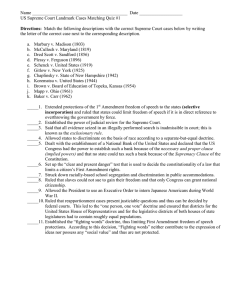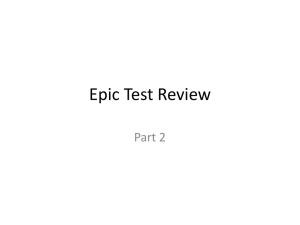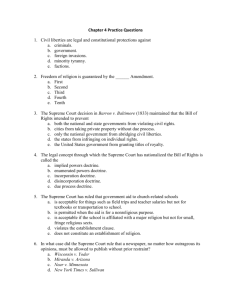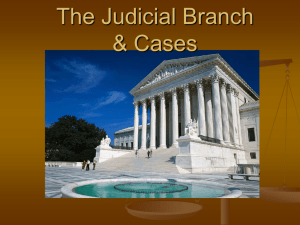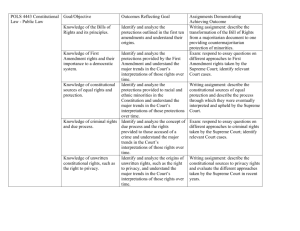Landmark Supreme Court Cases
advertisement
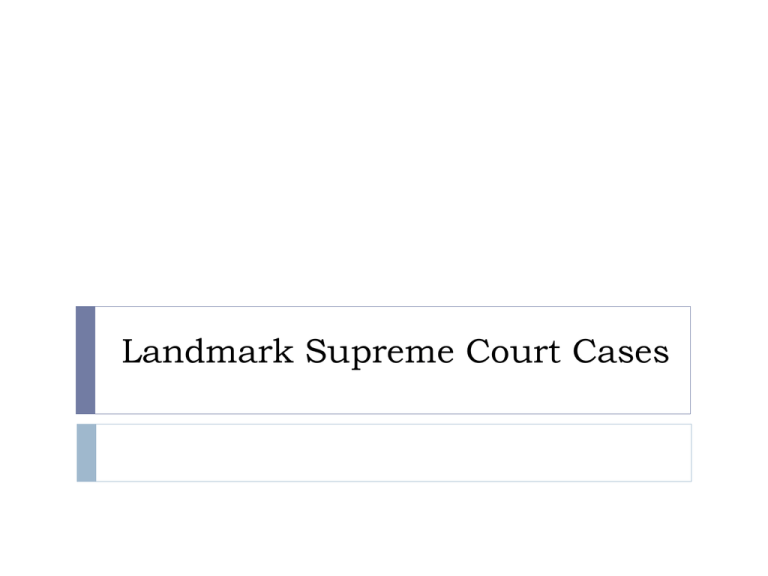
Landmark Supreme Court Cases Notes Read the BACKGROUND aloud. Write the highlighted area in your notebook pg 16 Complete the Court Case worksheet Hazelwood School District v. Kuhlmeier (1988) BACKGROUND – Principle of High School ordered two pages of from the school newspaper to be deleted. The two pages included an articles on the teen pregnancy and impact of divorce on student in school Constitutional Issue: Does the 1st amendment freedom of speech prevent school administrators from regulating student speech Court Decision: 5 to 3 against students, school cans regulate students speech Gideon v. Wainwright (1963) BACKGROUND – Gideon, a petty thief who had already served four prison terms, was arrested for breaking into a poolroom in Panama City, Fl and stealing a pint of wine & cigarettes. He asked the judge to appoint him an attorney and he was denied because Florida law only provided one for a capital crime (where death could a penalty. Constitutional Issue: Is a defendant in a criminal case who cannot afford an attorney deprived the 6th amendment right to counsel. Court Decision: Courts ruled in his favor, guaranteeing anyone brought to court an attorney. West Virginia Education v. Barnette (1943) BACKGROUND – West Virginia implemented a mandatory flag salute in public schools. Students who did not comply were punished by expulsion from school. Barnette’s children who were Jehovah’s Witness (religious group who refused to participate in government) were expelled from school. They appealed to the supreme court Constitutional Issue: Did mandatory flag salute violate the 14th, equal protection clause & the 1st amendment: freedom of religion Court Decision: Courts ruled 6-3 in favor of the Barlette’s saying it DID violate the 1st amendment. Miranda v. Arizona (1966) BACKGROUND – Ernesto Miranda was arrested at his home, accused of rape & kidnapping. Questioned at the police station he was not advised of his right to be silent & to have an attorney. After two hours of questioning he signed a written confession. He was found guilty and sentenced to 30 yrs in prison. He appealed to the Supreme court. Constitutional Issue: did the questioning violate the 5th amendment right, and did the environment Court Decision: Courts ruled 5-4 in favor of the Miranda saying it DID violate the 5st amendment. Miranda Rights are a direct result of this case Wisconsin v. Yoder (1972) BACKGROUND – Amish, a religious group who separate themselves from the modern world, operate their own elementary schools, however their education ends at 8th grade. The state required children to attend school until 16 years old. They refused to obey this law and send their children to a public school. Constitutional Issue: Did the 1st amendment (freedom of religion) protect them from being forced to send their children to public high school if it was against their religious beliefs Court Decision: Courts ruled 6-3 that Amish could not be forced to send their kids to public once they completed 8th grade. District of Columbia v Heller BACKGROUND – Handgun possession is banned under District of Columbia law banned handgun possession. The law prohibits the registration of handguns and makes it a crime to carry an unregistered firearm. Furthermore all lawfully owned firearms must be kept unloaded and dissembled or bound by a trigger lock unless they are being used for lawful recreational activities Constitutional Issue: 2nd amendment: right to bear arms Court Decision: Courts ruled in Heller’s favor, stating it violated his 2nd amendment right. States cannot not pass laws pertaining to the right to bear arms if it violated the federal law Bush v. Gore BACKGROUND – 2000 presidential election was a very close tie. Who would be become president depended on Florida. Florida voted by punching a hole in the ballot card and the votes counted by machine. About 60, 000 ballots were not counted because the machine did not detect holes. Gores appealed to Fl. Supreme Court and Florida was to recount ballets. Bush appealed to U.S Supreme Court. Constitutional Issue: Can the U.S Supreme Court over rule state court decisions and weather appointed judiciary affect democratic elections Court Decision: Courts ruled 5-4 to end hand recount and announced the next president. Tinker v. Des Moines BACKGROUND – Students in Des Moines decided take part in political protest of the Vietnam War by wearing black armbands to schools. Two days before protest, school board created a new policy banning armbands and those who did were suspended for two days. Constitutional Issue: Can the school officials prohibit students from warming armbands to symbolize political protest. Court Decision: Courts rules 7-2 in favor of the students. Symbolic speech can not be punished if it is peaceful. Mapp v. Carr (1962) BACKGROUND – While searching for a bombing suspect, police found evidence of a separate crime. The police did not have the right to enter the house nor have a search warrant. Constitutional Issue: Can evidence discovered in the process of illegal search be used as evidence Court Decision: Courts rules 5-3 in favor of Mapp, stating that illegally obtained evidence is inadmissible in a state court. Exclusionary rule now applies


